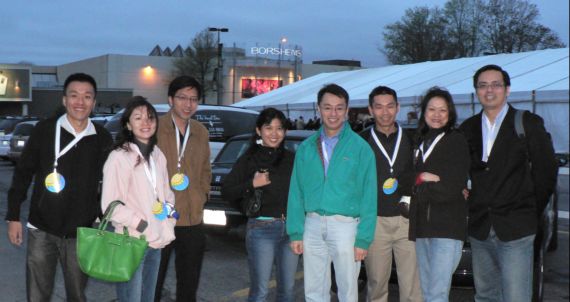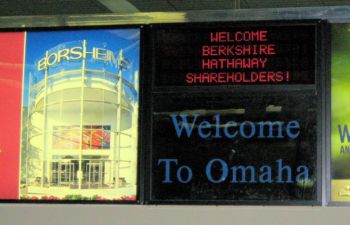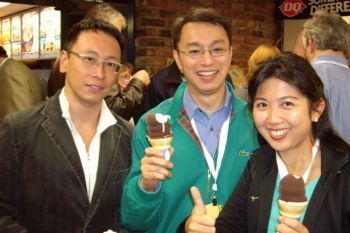

YOU CAN’T BE anything but a serious investor if you’re willing to make the gruelling 30-hour trip from Singapore to the famed Berkshire Hathaway annual general meeting two years in a row. And attend it as a bona fide shareholder rather than as a guest of a shareholder.
That’s exactly what Ansgar Cheng and his wife, Moonlake, have done.
I first met them at this year’s Berkshire AGM in Omaha, Nebraska, and found them to be investors with more than a few gems of wisdom to share.
They hold full-time jobs in the healthcare industry and have enthusiastically honed their investing acumen over many years.
Dr Cheng, 42, is a consultant prosthodontist at Specialist Dental Group in Mount Elizabeth Medical Centre.
He was born in Hong Kong to, he says, humble parents who ran small businesses.
No bookworm, he represented his school in middle-distance track events throughout his high school and university years.
He graduated with distinction from dental school and top of his class in graduate school. His current interests include a small collection of armored model vehicle and books on champion investors.
He says he is not a good traveler in that he travels mainly for work or to see family and friends. “In a way, I am a deadbeat, no-fun kind of traveler but I can enjoy a nice piece of T-bone steak or any food anytime with good company. Friends are priceless.”
Originally from Kuala Lumpur, Moonlake, 39, went to the US and Canada for higher education. She dreamt of becoming a high-powered corporate lawyer, and qualified to practice law in Canada, UK and New York.
After starting a family and emigrating to Singapore, she switched fields and started working in healthcare marketing. She was formerly the CEO of eMenders, a group of more than 50 leading medical and dental specialists based at Mount Elizabeth Medical Centre. She is currently a director with Specialist Dental Group, also based at Mount Elizabeth Medical Centre.
She says she has always had an interest in the media – she went to journalism school in the US - and is a member of the Programme Advisory Committee for English Programs. This committee advises the Media Development Authority of Singapore on the range and quality of English television and radio programmes and gives suggestions for their improvement.
In Singapore, the couple live in an apartment in the Orchard area with daughters Hana aged four and Allie, five. Quips Dr Cheng: “The building is so old that Allie once asked my wife: ‘Mommy, our home is very old, right?’ I guess kids develop a common sense on their own.”

Q When did you start investing and what led to that?
Ansgar: My parents ran small businesses. I had heard business stories from them as a boy. Thus the idea of working hard and using money to grow money was not alien to me since I was young. If investing is defined as putting money into something with the vision that it may become bigger with time, then Moon and I only started in the 90s. However, if investing is defined a little broader, then we have started off very early with our education.
Moon has four degrees from North America – including joint MBA and Law degrees at York University, Toronto - and I have my fair share of professional degrees and titles. The education that we received forms the core of our intrinsic values which, in turn, enhances our analytical thinking and decision-making abilities.
Q How has that initial investment turned out?
Moon: Our initial approach to investments consisted of trading in stocks. It was a combination of reading the news and gut feeling, which did not turn out to be very reliable!
One of my grandaunts was an excellent stock investor. Back in 1995, on one of our annual trips to Singapore (we were then living in Canada), Ansgar asked for her advice on investing. She simply told him to ‘buy and hold’. We tried it and had mixed results, however. It was only some time later that we realized that the key to investing was to buy excellent assets and hold onto them. The quality of the asset comes first.
Q Over the years, how has your investment approach changed?
Ansgar: Very simple - spend below our means and invest the rest in solid businesses.
Moon: Instead of just reading analysts’ recommendations or newspapers alone, we started looking at management behavior of the companies we were interested in, i.e., whether they had a solid track record of good stewardship. An example would be the compensation criteria and whether it is tied to the performance of the company. Among all, honesty and integrity over a long period of time rank the highest on our stewardship checklist. We also asked ourselves whether this was a business/company that we could see ourselves holding on to for decades to come.
Q What have you done to educate yourself about investing?
Ansgar: Professionals (e.g. doctors and dentists) easily spend 5 to 10 years in a structured learning environment with excellent teachers/mentors to learn the basics of the professional trade. But most of us are not taught the essence of investment in a structured way, and meaningful formal education in this area is not easy to find. Imagine how much longer one would need to get competent with investments when we are holding a full-time job and there is no formal teaching/mentorship! With this understanding, we simply adopted a life-long learning attitude for investing. Our teachers? We simply try to learn from the deeds of the world champion team in investing - Charlie Munger and Warren Buffet. It is not only about investing but rather about how to live and live right. Philip Fisher, Ben Graham and John Neff are some other excellent people to learn from.
Moon: I try to keep up to date on the news, subscribe to certain financial newsletters and publications and also read up on the investment philosophy of some gurus.

Ansgar:
Solid businesses with excellent long-term track records and reasonable growth potential that are run by top quality honest and capable people whom we admire.
Moon: Ansgar said it all. I have nothing further to add.
Q Are you picking or selling stocks in this bear market now?
Ansgar: In general, we almost never sell. This mentality requires us to be cautious when we purchase and it also requires us to live a rational and down-to-earth life. What we aim at is a little bit of a gain on a regular basis over a very long period of time.
Moon: We rarely sell unless there is a compelling reason to do so. After all, there are also transaction costs involved in selling. Furthermore, it is impossible to time the market – if one sells at a certain point, one is never sure whether it was the optimum time. In addition, if the company is one that we would want in our portfolio anyway (which is why we bought it in the first place), we will not be able to predict whether we can reacquire the shares at a subsequent date at a better price.
Q So what are, say, five of the tightly-held and most-loved stocks? How long have you owned them and how have they done?
Ansgar: First of all, we hold very few counters. In principle, we would rather not disclose the specifics of our holdings. That being said, we like the financial services industry, even though it is out of favor currently. The businesses that we hold are all very well respected in their respective industries. We have held on to some of them for more than a decade and we are looking forward to many more decades to come. Some of the businesses we simply wish we had acquired earlier. We reinvest dividends regularly and this is where compound interest works its magic.
Q Do you invest your own money? Or is there pooled money and both of you will discuss and agree on decisions?
Ansgar: In our marriage, since day one, there is no such thing as “your money” or “my money”. We share everything we have and we had little to start off with. I made a promise to Moon a few days before I left for USA that if I had only one bowl of porridge left, she would have half of it. Our understanding is that, since we are willing to share our lives together, we need to be willing to share our bank accounts! This requires us to be more accountable to each other but marriage is about permanent mutual accountability and permanent commitment. In a lot of circumstances, we act independently on our money ideas. After all, we fully understand that our interests are aligned.
Moon: We will be celebrating our 16th anniversary this year (we married young!). Almost everything we own is owned jointly. However, we do bounce ideas off each other as we focus on different areas, and for major decisions, we act unanimously.
Q Which asset class – properties, equities, fixed income, etc - are you more keen on investing now? Why?
Ansgar: There is no particular class of assets that we are particularly keen on at any given moment. Reasons being that money is only invested when we see something worth investing regardless of form or type. In general, we do not like unnecessary leverage.
Moon: I like equities as I believe that over the long run, this gives better returns, more liquidity and fewer headaches than some of the other asset classes. On the other hand, I am also interested in property - my husband calls it the “nesting instinct” of women.
Q Which asset classes are you invested in and their proportions in your total portfolio?
Ansgar: Businesses comprise approximately 84% of our assets and properties approximately 16%.
Q How do you juggle time for your professional work and for personal investments?
Ansgar: While we keep an eye on our personal investments from time to time, it is not something that we need to take action on all the time. For example, we never engage in actions commonly recommended, such as ‘rebalancing portfolios’. I try to read up on various topics after my two little girls go to sleep every night. To me, it is a form of relaxation and enjoyment..
Moon: It has been a little more challenging for me in the past few months, as the workload has increased and I have many roles - as a professional, mother, wife, daughter and investor. I am fortunate that my work schedule is rather flexible even though the time spent is substantial – thus, I try to make time in the mornings or evenings before bedtime to spend on financial matters which include monitoring investments and other little things to make our lives run more smoothly.
This article was first published in Pulses magazine and is reproduced here with permission.
Related stories: WARREN BUFFETT: Our pilgrimage to visit the Sage of Omaha
Our visit to Warren Buffett's Berkshire AGM: Wow!

